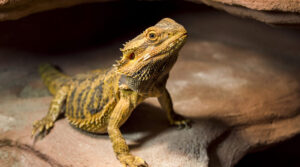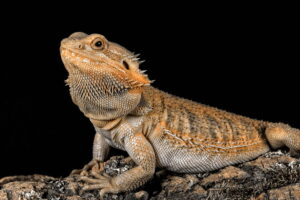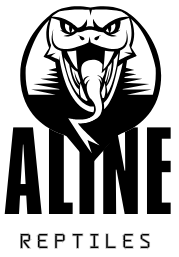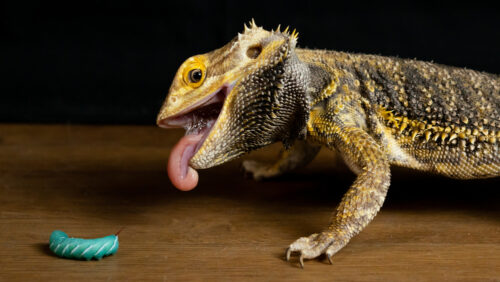Have you ever looked at your bearded dragon and wondered, “Am I feeding it the right things?” You’re not alone! Caring for a bearded dragon can be an incredibly rewarding experience, but it also comes with the responsibility of ensuring their diet is balanced, nutritious, and aligned with their specific needs.
As omnivores, bearded dragons require a variety of foods to thrive—everything from leafy greens to insects to the occasional fruit. But getting it right can be tricky, especially for first-time owners. Whether you’re new to keeping a bearded dragon or you’re looking to enhance its diet, understanding what to feed and what to avoid is crucial for their health and longevity.
In this guide, we’ll break down everything you need to know about what can bearded dragons eat, how to prepare their food, and what foods to avoid. From the best vegetables to the most nutritious insects, we’ll cover it all. By the end, you’ll feel confident in providing your bearded dragon with a diet that promotes a happy, healthy life.
What Do Bearded Dragons Eat in the Wild?

Before diving into the specifics of their diet in captivity, it’s important to understand what bearded dragons eat in the wild. This knowledge helps guide your decisions when it comes to choosing food in your pet’s daily routine.
In their native habitat of Australia, bearded dragons are omnivores. This means they have a mixed diet that includes both plant-based and animal-based foods. Wild bearded dragons primarily feed on:
- Insects: Crickets, beetles, moths, and other small invertebrates form a significant portion of their diet.
- Vegetation: Wild bearded dragons also munch on a variety of grasses, leaves, and shrubs.
- Occasional Prey: While they mainly focus on insects, they will sometimes consume small vertebrates, such as lizards or even baby rodents.
The combination of plant material and animal protein is crucial for their growth and health. In captivity, we aim to replicate this diverse diet as closely as possible, ensuring they get all the essential nutrients they need.
The Essential Food Categories for Bearded Dragons
Bearded dragons, while omnivorous, have specific dietary needs depending on their age, activity level, and overall health. A balanced diet includes a mix of insects, vegetables, fruits, and occasional treats. Here’s a breakdown of the main food categories:
Insects
Insects should make up a significant portion of a bearded dragon’s diet, especially during the juvenile and growing stages. Insects are an excellent source of protein, which is crucial for their development and overall health. Here are some commonly fed insects:
- Crickets: These are perhaps the most popular food for bearded dragons. Crickets are rich in protein and are easy to find in pet stores.
- Dubia Roaches: These roaches are another excellent choice, providing a good balance of fat and protein. They are also easier to digest than some other insects.
- Mealworms: While mealworms can be fed occasionally, they should be given in moderation, as they are higher in fat compared to other insects.
- Black Soldier Fly Larvae: These larvae are another great protein source and are often considered a more nutritious option than mealworms.
- Superworms: Similar to mealworms but larger, superworms can be fed occasionally but should not form the bulk of the diet.
Note: Always gut-load your insects before feeding them to your dragon. Gut-loading refers to feeding the insects nutritious food before they are fed to your pet, ensuring that your bearded dragon gets additional vitamins and minerals from the insects they consume.
Vegetables
Vegetables are the cornerstone of a healthy diet for adult bearded dragons. While they can eat insects every day, vegetables should be offered at every meal. A variety of leafy greens and colorful veggies will provide your dragon with fiber, vitamins, and minerals essential for their well-being. Here are some of the best vegetables to offer your bearded dragon:
- Collard Greens: Rich in calcium and fiber, collard greens should be a regular part of your bearded dragon’s diet.
- Mustard Greens: Another excellent source of calcium, vitamins, and antioxidants.
- Dandelion Greens: Dandelion greens are nutrient-dense, providing calcium, iron, and vitamins A and C.
- Butternut Squash: High in vitamins A and C, butternut squash is great for providing essential nutrients.
- Bell Peppers: Rich in vitamin C, bell peppers are an excellent choice to offer your dragon. They also provide a colorful variety to stimulate their appetite.
Other vegetables like kale, zucchini, and turnip greens can be fed occasionally, but it’s important to avoid high-oxalate greens like spinach and swiss chard, as they can cause calcium absorption issues.
Fruits
While fruits are a tasty treat for bearded dragons, they should only be given in moderation due to their sugar content. Some fruits, however, provide excellent nutrients and hydration, making them an important part of their diet. Here are some fruits that are safe for your bearded dragon:
- Berries: Blueberries, raspberries, and strawberries are great choices for your dragon. They are low in sugar and packed with antioxidants.
- Mango: High in vitamin A, mango can be a good occasional treat for your dragon.
- Papaya: Another fruit rich in vitamin A, papaya is excellent for digestion.
- Melons: Watermelon, cantaloupe, and honeydew can be given to provide hydration, especially during hot weather.
It’s important to remove the seeds from certain fruits (like watermelon) before feeding them to your bearded dragon, as the seeds could pose a choking hazard.
Other Foods
In addition to the basics of insects, vegetables, and fruits, bearded dragons can also enjoy the occasional treat, such as:
- Hard-Boiled Eggs: Bearded dragons love eggs, and they provide a rich source of protein. Eggs should be given sparingly, as too much can lead to an imbalance in their diet.
- Small Pieces of Cooked Meat: While not a necessary part of their diet, small amounts of cooked chicken or turkey can be offered as a rare treat.
Supplements
GET SOME SUPPLEMENTS AT A DISCONT PRICE
Although a well-balanced diet can provide most of the necessary nutrients, supplements are essential to ensure your bearded dragon’s bones and immune system remain strong. The two most important supplements are:
- Calcium: Bearded dragons require extra calcium to maintain healthy bones and prevent metabolic bone disease (MBD). Dust insects with calcium powder before feeding.
- Vitamin D3: Vitamin D3 is necessary for calcium absorption. You can either use a UVB light that mimics the sun’s rays or offer a vitamin D3 supplement.
What to Avoid Feeding Your Bearded Dragon

While bearded dragons can eat a variety of foods, there are also several foods that you should avoid completely. These can be harmful to your pet and may lead to health issues.
- Avocado: Avocados contain persin, a substance that is toxic to bearded dragons.
- Onions and Garlic: Both onions and garlic are toxic and can cause digestive upset or more severe health issues.
- Lettuce: While not toxic, lettuce has little nutritional value and can cause diarrhea in bearded dragons.
- Citrus Fruits: Oranges, lemons, and other citrus fruits can cause stomach upset in bearded dragons.
- Rhubarb: Rhubarb is highly toxic to bearded dragons and should never be fed.
Avoid feeding your bearded dragon foods that are high in fat, as these can lead to obesity and other health problems. Waxworms and other fatty insects should only be fed occasionally.
How to Properly Prepare and Serve Food
Feeding your bearded dragon is not just about what you give them, but how you prepare it. Here are some key tips for proper food preparation:
- Chop Vegetables into Small Pieces: Bearded dragons have small mouths, so it’s essential to cut vegetables into manageable pieces.
- Offer a Variety: Try to provide a colorful mix of vegetables to keep meals exciting and balanced.
- Gut-Load Your Insects: Feed your insects nutritious foods for 24-48 hours before offering them to your bearded dragon. This ensures they’re packed with extra nutrients.
- Use Shallow Dishes: Use shallow dishes for offering food. This makes it easier for your dragon to eat and helps prevent food from spilling into the substrate.
How to Introduce New Foods to Your Bearded Dragon
Introducing new foods to your bearded dragon can be a delicate process. Some dragons can be picky eaters, while others may take to new foods right away. Here’s how to make the transition smoother:
- Start Slowly: Gradually introduce new foods alongside familiar ones. This allows your dragon to get used to the taste and texture.
- Watch for Reactions: Bearded dragons may reject new foods at first. If they seem uninterested, try offering the new food at a different time or in a different way (e.g., chopped into small pieces or mixed with their favorite food).
- Stay Patient: Some dragons can take time to accept new foods, so it’s important to be patient and persistent.
Signs of a Healthy Diet
How can you tell if your bearded dragon’s diet is working? There are several signs of a healthy, well-fed dragon:
- Healthy Weight: Your dragon should not be too thin or too heavy. Check for proper body condition by gently feeling the rib cage.
- Lively Behavior: A well-fed bearded dragon should be active and alert, not lethargic.
- Shiny Skin: Proper nutrition supports healthy skin shedding and a vibrant appearance.
- Proper Digestion: Healthy bearded dragons should have regular bowel movements. Runny stools or constipation can indicate dietary imbalances.
Common Mistakes to Avoid
Even experienced bearded dragon owners can make mistakes when feeding their pets. Here are some common mistakes to watch out for:
- Overfeeding: While it’s tempting to feed your dragon often, overfeeding can lead to obesity and health problems.
- Not Providing Enough Variety: Bearded dragons need variety to ensure they get all the necessary nutrients.
- Feeding the Wrong Insects: Not all insects are safe for bearded dragons. Avoid wild-caught insects, as they may contain pesticides or parasites.
Conclusion
As a concerned bearded dragon owner, it is important you care about what can bearded dragons eat. A healthy, balanced diet is the cornerstone of a happy, thriving bearded dragon. By providing a variety of insects, vegetables, and fruits—and avoiding harmful foods—you can ensure your pet has the nutrients it needs to live a long and healthy life.
With patience and a bit of research, you’ll be well on your way to being a top-notch bearded dragon caregiver.

